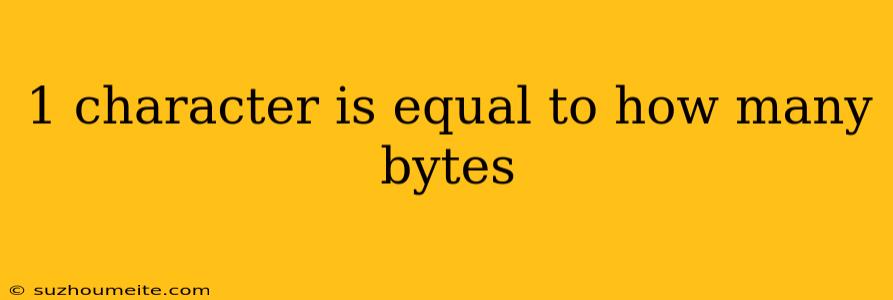1 Character is Equal to How Many Bytes?
When working with computers, it's essential to understand how characters are stored and represented in memory. A fundamental question that arises is: how many bytes is one character equal to?
The Answer: It Depends
The number of bytes required to store a single character depends on the character encoding scheme used. A character encoding scheme is a set of rules that defines how characters are represented as binary data.
ASCII (1 byte per character)
The American Standard Code for Information Interchange (ASCII) is one of the earliest character encoding schemes. It assigns a unique binary code to each character, using 7-bit binary numbers. Since each character is represented by 7 bits, it fits in a single byte (8 bits). Therefore, in ASCII, 1 character is equal to 1 byte.
UTF-8 (1-4 bytes per character)
UTF-8 (Unicode Transformation Format - 8-bit) is a variable-width character encoding scheme that can represent every character in the Unicode character set. The number of bytes required to store a character in UTF-8 varies:
- ASCII characters (U+0000 to U+007F): 1 byte
- Unicode characters (U+0080 to U+07FF): 2 bytes
- Unicode characters (U+0800 to U+FFFF): 3 bytes
- Unicode characters (U+10000 to U+10FFFF): 4 bytes
In UTF-8, 1 character can be equal to 1, 2, 3, or 4 bytes, depending on the character's Unicode code point.
UTF-16 (2 or 4 bytes per character)
UTF-16 (Unicode Transformation Format - 16-bit) is another character encoding scheme that can represent every character in the Unicode character set. The number of bytes required to store a character in UTF-16 is:
- Unicode characters (U+0000 to U+FFFF): 2 bytes
- Unicode characters (U+10000 to U+10FFFF): 4 bytes
In UTF-16, 1 character is equal to 2 or 4 bytes, depending on the character's Unicode code point.
In Conclusion
The number of bytes required to store a single character depends on the character encoding scheme used. While ASCII assigns 1 byte per character, UTF-8 and UTF-16 use variable-length encoding, resulting in 1, 2, 3, or 4 bytes per character. Understanding these differences is crucial when working with text data in computing.
